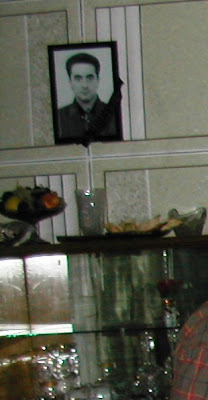Letter 25 : That stubborn pain, the pain of hope!

Yeghegnadzor, Monday, November 12, 2007 Here, on the steep slopes of our mountains, there is no time for life (Kyanqi hamar zhamanaq ch’ka). We do, like those who rise towards God: We forget pain! That stubborn pain, the pain of hope! Onnik is the man in his seventies who lives at 5 Khachatryan, the other end of our street. He welcomed us so kindly when we first moved in that I thought I would ask him for advice on where to acquire the goods and services we needed locally. I called several times the number he had given us; noone answered. Then I saw him on the street and asked if I had taken-down his number wrong. He said no, you have the correct number, it is just that they have cut my phone line (for non-payment - 900 drams). So I asked him if perhaps his wife would be willing to help us with our laundry, since city water rarely reached our house at the time (because of our altitude). He checked with her and we started taking our laundry there and his phone line starte...

